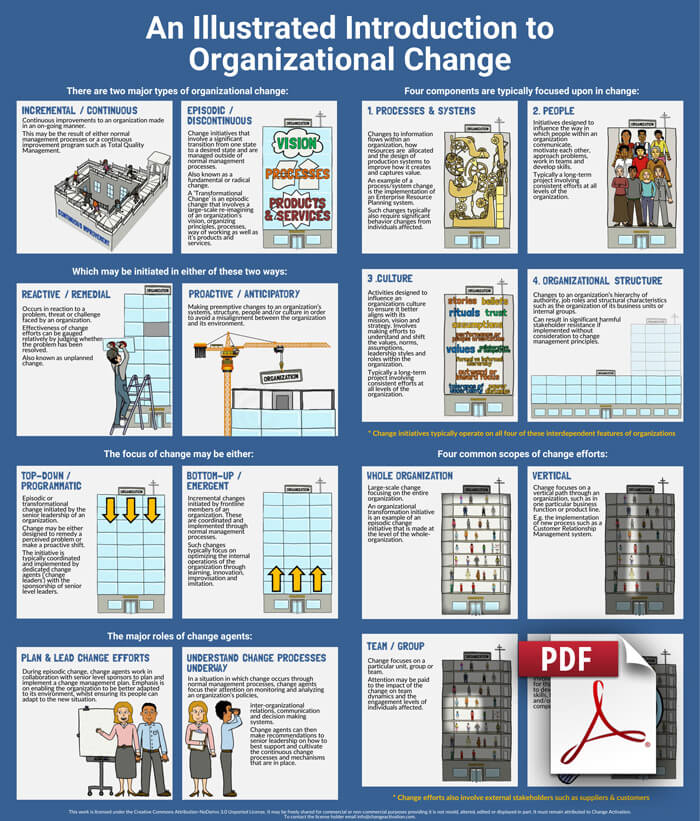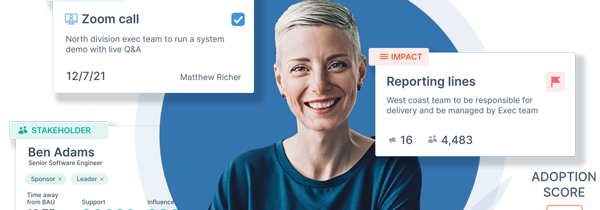
Engaging two-page PDF poster that introduces the various types of change. Use it to foster a better understanding of the components within organizations that typically undergo changes.
Also use this poster to create understanding around:
- the reasons organizations change
- how change impacts upon organizations
- the major types of organizational change
- the role of change leaders
How to make the most of it:
- Share it with colleagues who are undergoing organizational change (or are about to).
- Print it, laminate it and place it on your organization’s wall to remind managers (and others) of the need to manage emotions during change.
- Use it as a handout for your change management program, course or training session.

An Illustrated Introduction to Organizational Change
There are two major types of organizational change:
1. INCREMENTAL / CONTINUOUS
- Continuous improvements to an organization made in an on-going manner.
- This may be the result of either normal management processes or a continuous improvement program such as Total Quality Management.
2. EPISODIC / DISCONTINUOUS
- Change initiatives that involve a significant transition from one state to a desired state and are managed outside of normal management processes.
- Also known as a fundamental or radical change.
A ‘Transformational Change’ is an episodic change that involves a large-scale re-imagining of an organization’s vision, organizing principles, processes, way of working as well as it’s products and services. This may be initiated in either of these two ways:
1. REACTIVE / REMEDIAL
- Occurs in reaction to a problem, threat or challenge faced by an organization.
- Effectiveness of change efforts can be gauged relatively by judging whether the problem has been resolved.
- Also known as unplanned change.
2. PROACTIVE / ANTICIPATORY
- Making preemptive changes to an organization’s systems, structure, people and/or culture in order to avoid a misalignment between the organization and its environment.
Four components are typically focused upon in change:
1. PROCESSES & SYSTEMS
- Changes to information flows within an organization, how resources are allocated and the design of production systems to improve how it creates and captures value.
- An example of a process/system change is the implementation of an Enterprise Resource Planning system.
- Such changes typically also require significant behavior changes from individuals affected.
2. PEOPLE
- Initiatives designed to influence the way in which people within an organization communicate, motivate each other, approach problems, work in teams and develop skills.
- Typically a long-term project involving consistent efforts at all levels of the organization.
3. CULTURE
- Activities designed to influence an organizations culture to ensure it better aligns with its mission, vision and strategy. Involves making efforts to understand and shift the values, norms, assumptions, leadership styles and roles within the organization.
- Typically a long-term project involving consistent efforts at all levels of the organization.
4. ORGANIZATIONAL STRUCTURE
- Changes to an organization’s hierarchy of authority, job roles and structural characteristics such as the organization of its business units or internal groups.
- Can result in significant harmful stakeholder resistance if implemented without consideration to change management principles.
The locus of change may be either:
TOP-DOWN / PROGRAMMATIC
- Episodic or transformational change initiated by the senior leadership of an organization.
- Change may be either designed to remedy a perceived problem or make a proactive shift.
- The initiative is typically coordinated and implemented by dedicated change agents (‘change leaders’) with the sponsorship of senior level leaders.
or… BOTTOM-UP / EMERGENT
- Incremental changes initiated by frontline members of an organization. These are coordinated and implemented through normal management processes.
- Such changes typically focus on optimizing the internal operations of the organization through learning, innovation, improvisation and imitation.
The major roles of change agents:
PLAN & LEAD CHANGE EFFORTS
- During episodic change, change agents work in collaboration with senior level sponsors to plan and implement a change management plan. Emphasis is on enabling the organization to be better adapted to its environment, whilst ensuring its people can adapt to the new situation.
UNDERSTAND CHANGE PROCESSES UNDERWAY
- In a situation in which change occurs through normal management processes, change agents focus their attention on monitoring and analyzing an organization’s policies, inter-organizational relations, communication and decision making systems.
- Change agents can then make recommendations to senior leadership on how to best support and cultivate the continuous change processes and mechanisms that are in place.
Four common scopes of change efforts:
1. WHOLE ORGANIZATION
- Large-scale change focusing on the entire organization.
- An organizational transformation initiative is an example of an episodic change initiative that is made at the level of the whole-organization.
2. VERTICAL
- Change focuses on a vertical path through an organization, such as in one particular business function or product line.
- E.g. the implementation of new process such as a Customer Relationship Management system.
3. TEAM / GROUP
- Change focuses on a particular unit, group or team.
- Attention may be paid to the impact of the change on team dynamics and the engagement levels of individuals affected.
4. INDIVIDUAL
- Emphasis of a change initiative is one particular individual. May involve the need for that individual to develop new skills, behaviors and/or competencies.
Sharing & copyright information
This resource is licensed under the Creative Commons Attribution-NoDerivs 3.0 Unported License. It may be freely used and shared for commercial & non-commercial purposes provided it remains attributed to Better Business Learning Pty Ltd (trading as ‘Change Activation’), is not modified or displayed in part, and is not re-sold. For further information contact info@changeactivation.com.
